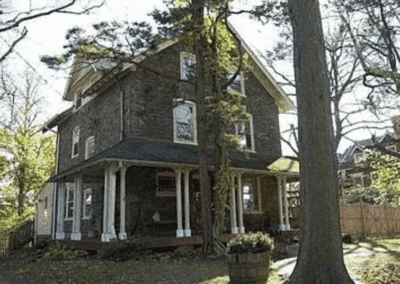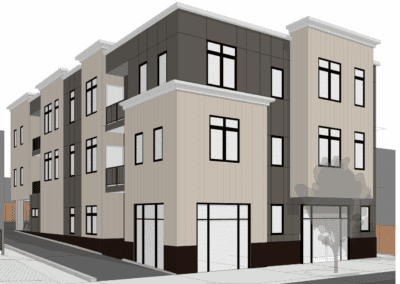Zoning
Zoning Meetings are held the first Wednesday on each month on an as needed basis.
https://us02web.zoom.us/j/84592812434?pwd=r1uCc0jKf0KyzT3wbelaJlJhC5Xj0M.1
Meeting ID: 845 9281 2434
Passcode: 553929
If you have any questions, please contact Committee Chair Ralph Pinkus at 215-266.2424 or rsp@pinkuslaw.com.
As a Registered Community Organization (RCO), we ensure that all residents and businesses have a chance to learn about and give feedback on nearby developments that affect them.
Monthly RCO Meetings: Every First Wednesday of the Month @ 7pm
What is Zoning?
Zoning regulates physical development within the City. Zoning regulations govern land use, the height and bulk of buildings, population density, parking requirements, placement of signs, character of development on private property, and property uses.
Explore more information below:
What is an RCO?
An RCO is a Registered Community Organization that is concerned with the physical development of the community.
West Mt. Airy Neighbors (WMAN) is the designated RCO for West Mt Airy.
The Philadelphia Zoning Code includes provisions to ensure that neighbors of proposed developments that have been denied approval are notified and have an opportunity to provide input regarding such zoning decisions that may impact them. RCOs receive early notification of zoning cases occurring within their stated boundaries. We then organize public meetings for the community to attend and hear from developers who are appealing their zoning refusal.
Where are Zoning Meeting and who can attend?
Zoning meetings take place the first Wednesday of every month (currently via ZOOM) and are open to anyone.
Please see the Upcoming Meetings section for Zoom links.
When is Zoning Approval Required?
Zoning is usually the first step in the development approval process. Each land use activity must demonstrate that it conforms to Philadelphia’s zoning laws – whether it’s simply a change in land use, a brand new construction project, or a rehabilitation project. Zoning regulations ensure that the land use, site layout, and building form on every parcel in the City of Philadelphia is compatible with its zoning map and provisions. .
Generally, a project will need a zoning approval (zoning permit) if it involves:
- New construction
- Changes of a use of a property
- Building an extension to an existing structure
How does it work?
Process: Initial Application → Refusal → Notification Process (RCO and near neighbors) → RCO Meeting → ZBA (Zoning Board of Adjustment) Hearing
- The Department of Licenses & Inspections (L&I) applies the code’s prescriptive standards to determine whether a project complies with the relevant codes. Developments or other physical changes that do not conform to the zoning code trigger a ZONING REFUSAL.
- The RCO is notified of the refusal and then convenes a public neighborhood meeting where the developers can present their projects to the neighborhood. Neighbors can ask questions and offer suggestions, and then vote on whether to support or oppose the project.
- As your RCO, WMAN must IMPARTIALLY document what occurred during the public meeting, including whether a vote was taken and, if so, record and describe the vote count. The Zoning Committee also votes in support of or opposition to the request for a variance. We then send a letter to the ZBA declaring the votes and any special concerns neighbors expressed.
Zoning terms to know:
Provisio
A Proviso is a condition attached to an approved agreement.
An RCO may negotiate with the developer to attach a condition in exchange for the neighbors’ approval of the project at the ZBA. If approved by the ZBA, the proviso is attached to the case and is entered into L&I’s records. A good proviso is one which limits the scope of the application to be more specific than the broad scope that was applied for.
Zoning Permits
Zoning permits authorize construction of or an addition to a building.
A permit is an official non-renewable document that authorizes a specific activity. Use Registration permits authorize a particular use of the building or ground.
There are three main paths to getting a zoning permit from the City: by right, by special exception, or by variance.
- By Right: When the project proposal complies with all zoning provisions applicable to the property.
- (use, dimensions, parking, signs, etc.), an applicant can get a zoning permit from L&I “by-right” without any action by the Zoning Board, Planning Commission, or City Council. Certain large projects must go through an advisory Civic Design Review process.
- When a developer is building “By Right,” they do not need neighborhood or RCO permission to proceed with the project.
- By Special Exception: The Zoning Code permits certain uses and development by special exception, which is
- granted by the Zoning Board if the project is compatible with the surrounding neighborhood.
- Variance: A zoning variance is an exception to the Code granted by the ZBA to permit a reasonable or practical use of a given piece of land. Sometimes special circumstances prevent projects from conforming to the Zoning Code standards. In these instances, applicants must obtain a variance from the Zoning Board to deviate from the zoning standards. The ZBA may find that the owner is under a hardship and grant a variance if the conditions of a specific parcel render it impractical for development under the provisions of the existing classification. Examples:
- Classes of use (e.g. residential, commercial, industrial)
- Specific uses (e.g. multi-family housing, bars/restaurants, auto repair)
- Parking (# of spaces, type, location, and access)
- Minimum lot size and set-back requirements
Additional information:
The Permit Proces
Submit Permit application to L&I → L&I issues Refusal → Developer to notify & meet with RCOs and public → ZBA reviews variance → Zoning Permit Issued by L&I, if application conforms to the Code
The permit process typically takes 3-6 months, depending on whether a Civic Design Review is required.
- Step 1: L&I will review the application, then issue a “refusal” when the project proposal does not comply with the Zoning Code.
- Step 2: The applicant may then choose to either 1) alter the project to make it conform to the Zoning Code, or 2) appeal the refusal to the Zoning Board for approval of the variance.
- Step 3: The applicant needs to post notice of the hearing on the subject property and notify and meet with registered community organizations in the project area. The RCO sends a letter of support or opposition based on a vote at the meeting.
- Step 4: The Zoning Board will hold a public hearing and use the criteria in §14-303(8) of the Zoning Code to verify that there are special circumstances at the property presenting an unnecessary hardship in complying with the Zoning Code.
- Step 5: If the Zoning Board approves of the variance, the applicant can pick up the zoning permit from L&I. If applicant does not meet previous re
Zoning Classifications
There are three types of neighborhood commercial mixed-use zoning districts. CMX-1 is intended for small-scale, low-impact, neighborhood-serving commercial uses. CMX-2 accommodates a wider range and size of commercial uses. CMX-2.5 is intended to accommodate commercial uses in a pedestrian-friendly environment in commercial nodes and along commercial corridors. CMX-1, CMX-2, and CMX-2.5 all accommodate residential uses, but CMX-2 and CMX-2.5 require a non-residential use on the ground floor.
- RSD (1, 2, 3), Residential Single-Family Detached Districts – Intended to accommodate detached houses on individual lots
- RSA (1, 2, 3, 4, 5), Residential Single-Family Attached Districts – Intended to accommodate attached and semi-detached houses on individual lots
- RMX (1, 2, 3), Residential Mixed-Use Districts – Intended to accommodate residential and mixed- use development, including master plan development.
- CMX (1, 2, 2.5), Neighborhood Commercial Mixed-Use Districts – Intended to accommodate neighborhood-serving retail and service uses, including pedestrian friendly retail commercial corridors..
Who evaluates the Zoning Application?
The Department of Licenses & Inspections (L&I). As the issuer of permits and licenses and the provider of inspections, L&I ensures public safety and growth within the City of Philadelphia. L&I applies the code’s prescriptive standards to determine whether a project complies with the code. Here are some of the services provided by L&I:
- USE REGISTRATION PERMIT
- ZONING PERMIT
- CONDITIONAL ZONING PERMIT
The Zoning Board of Adjustment (ZBA) is an independent board comprised of five members appointed by the Mayor. The Zoning Board of Adjustment hears and decides appeals in zoning matters, considers special ordinances, and grants variances. The board handles the following matters:
- Appeals of zoning decisions made by L&I
- Dimensional and use variances
- Special exception approvals
Zoning Board of Adjustment (ZBA) Hearings
ANYONE can testify at a ZBA hearing about any particular development project. You don’t have to participate in the RCO process to weigh in. Neighbors are encouraged to attend and testify.
The City Planning Commission (Planning Commission) is charged with guiding the orderly growth and development of the City of Philadelphia. It involves the Commission in City-wide and community planning as well as projectspecic reviews and approvals, such as:
- SUBDIVISION APPROVAL
- FLOODPLAIN APPROVAL
- REVIEW OF PARKING GARAGES
- FACADE REVIEWS
There are no upcoming events, but check back soon for more information.
View Calendar



